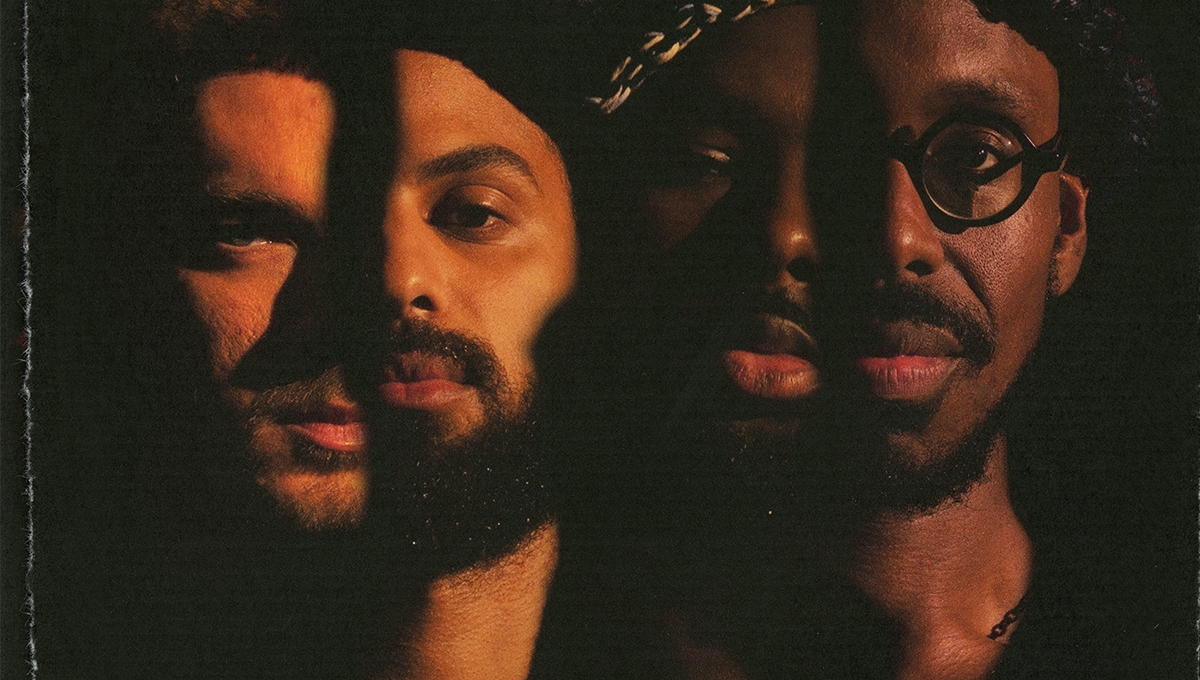By Mat Hick, MA Music
Sons of Kemets’ Roundhouse debut marked their largest headline show to date, touring their critically acclaimed album Black to the Future. The group consists of saxophonist Shabaka Hutchings, tuba player Theon Cross, and drummers Tom Skinner and Eddie Hick. Though nominally a quartet, all the musicians push the comfortable boundaries of genre, demonstrating innovative ways of playing instruments and expanding the ways in which music can open up space for negotiating identity and opposing structural inequality globally.
Opening for the group were DJ’s Alex Rita and Erol from Touching Bass, and London-based rapper Lex Amor, both setting the scene for Sons of Kemet’s return to the city. Poet, Joshua Idehen, introduces the ‘Ground Rules’ for the night that include respecting each other’s space, having fun, and a half-joking reminder that this was a counter-hegemonic space directly challenging racist institutions like the Tory Government and the police. Idehen then instructed the crowd to rapture, applause and stomp the band onto the stage, working the crowd into a frenzy for the band to appear.
From the outset Sons of Kemet brought a palpable energy that filled the Roundhouse; opening with ‘In Memory of Samir Awad’ a tribute to a 17-year-old Palestinian boy murdered by Isreali police, it was clear that we were there to engage with the anti-fascist and anti-racist discourses that underpinned Hutching’s compositions. Sons of Kemet’s set is without break, using dazzling solos to transition between tracks from the band’s latest album Black to the Future that included ‘Hustle,’ ‘For the Culture,’ and ‘Pick Up Your Burning Cross’ that were still powerful despite missing contribution from Kojey Radical, Lianne La Havas, D Double E, Moor Mother, and Angel Bat Dawid. The introduction to ‘Energy’ and transition into ‘Rituals’ was a solo performed by Tuba player Theon Cross, in which he demonstrated his mastery of the instrument and utterly distinctive style of playing. In a gig led by two instrumentalists demonstrating their immense virtuosity it could have been easy to overlook the drummers. Instead, they created the intricate and recognisable grooves throughout that kept the crowd moving together.
The only feature throughout the set was the return of Joshua Idehen, who led on a crowd pleasing performance of ‘My Queen is Ada Eastman’ with adjusted lyrics of ‘Boris Johnson, can’t do shit… All you Tory’s, go jump off a cliff’ before exclaiming ‘I’m Still Here’ – powerful against a backdrop of continued institutional racism, the Tory Government’s ‘Nationality and Borders Bill’ and Policing Bill removing citizenship rights, increasing police arrest powers, and a mishandled pandemic. In contrast, Hutchings spoke only to introduce the members of the band, opting instead to let the ‘music speak for itself.’ Before the encore he addressed the audience, imploring us to ‘keep the same energy you felt from the music and from dancing with others: keep it high when you head out there.’ What was sure was that the energy was frantic, malleable, and politically mobilising, in large part due to the feature of an underpinning idea behind Hutching’s compositions: Afrofuturism.
Afrofuturism features throughout Sons of Kemet’s growing discography creating alternative Black futurities that challenge linear conceptualisations of time and position the past, present, and future as interchangeable and mutually signifying. As such, time and space dissolve within the music to create an ambivalent space for the negotiation of Black identity. Black to the Future might be a direct reference to the article of the same name written by Mark Dery in 1994, where he discusses the emergent field of Afrofuturism with Samuel R. Delany, Greg Tate, and Tricia Rose.
Idehen’s feature highlights the way the ambivalences of time facilitated by Afrofuturism creates a space for interrogating the way historical legacies of colonisation inform structural racism in contemporary Britain, and how it was being opposed. In a performance of the opening track, Idehen speaks over the atonal moans of Hutchings and Cross, moving within the ambivalences of time and space opened up by Afrofuturism to explore how his identity has been shaped by histories of racism and opposition. ‘We are rolling your monuments down the street like tobacco’ reverses metaphors of forced migration to set in motion seemingly immovable statues and the static histories of racism and colonisation they monumentalise – notably Edward Couldson – to dissolve temporal parameters and critique the legacies of slavery that are visible on our streets today. The ‘like tobacco’ part signifies the material conditions of slavery, reducing the slaver’s statue to the very commodities that slaves were exchanged for in emergent industrial capitalist markets. The set finishes with ‘Afrofuturism’ from their 2015 album Lest We Forget What We Came Here To Do, sonically restating what is being spoken through the music.
With their Roundhouse debut , Sons of Kemet presented Jazz at its most pivotal, expanding the parameters of genre and the complex interactivity of time and space in the negotiation of Black identity in contemporary Britain.
With their Roundhouse debut Sons of Kemet presented Jazz at its most pivotal, expanding the parameters of genre and the complex interactivity of time and space in the negotiation of Black identity in contemporary Britain.
Image Caption: Sons of Kemet (credit: Roundhouse)
